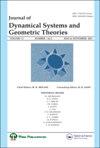Distributional Chaotic Generalized Shifts
IF 0.4
Q4 MATHEMATICS
Journal of Dynamical Systems and Geometric Theories
Pub Date : 2017-08-16
DOI:10.1080/1726037X.2020.1774156
引用次数: 0
Abstract
Abstract Suppose X is a finite discrete space with at least two elements, Γ is a nonempty countable set, and consider self–map φ: Γ → Γ. We prove that the generalized shift σφ : X Γ →X Γ with σφ((Xα) α ∈Γ) = (Xφ (α))α∈Γ (for (Xα ) α ∈Γ ∈ X Γ) is: distributional chaotic (uniform, type 1, type 2) if and only if φ : Γ → Γ has at least a non-quasi-periodic point, dense distributional chaotic if and only if φ : Γ → Γ does not have any periodic point, transitive distributional chaotic if and only if φ : Γ → Γ is one–to–one without any periodic point. We complete the text by counterexamples.分布混沌广义位移
摘要假设X是一个至少有两个元素的有限离散空间,Γ是一个非空可数集,并考虑自映射φ:Γ→ Γ。我们证明了广义移位σφ:XΓ→具有σφ((Xα)α∈Γ)=(Xφ(α))α∈→ Γ至少有一个非拟周期点,稠密分布混沌当且仅当φ:Γ→ Γ不具有任何周期点,传递分布混沌当且仅当φ:Γ→ Γ是没有任何周期点的一对一。我们通过反例来完成这篇文章。
本文章由计算机程序翻译,如有差异,请以英文原文为准。
求助全文
约1分钟内获得全文
求助全文

 求助内容:
求助内容: 应助结果提醒方式:
应助结果提醒方式:


